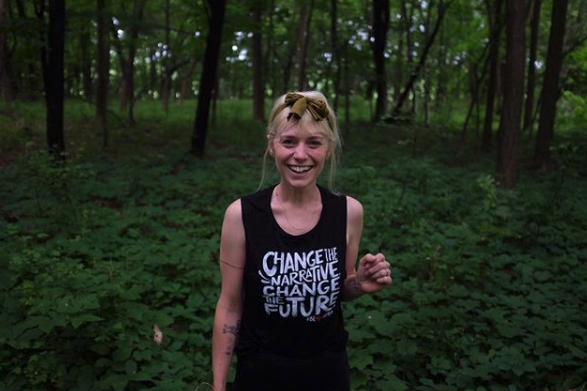Retiran libro de cocina de una estrella de Instagram porque sus recetas podrían ser peligrosas
En estos tiempos tener muchos seguidores en las redes sociales parece ser una garantía del éxito, pero también, como demuestra el caso de una joven estrella de Instagram, puede convertirse en un bumerán.
Un libro de cocina de Johnna Holmgren, también conocida como Fox Meets Bear en la red social, será retirado del mercado después de que los críticos advirtieron que algunas de las recetas podrían ser peligrosas.

En una declaración en el sitio de su empresa matriz, Crown Publishing, la editorial Rodale Books dijo que Holmgren y sus editores acordaron mutuamente “descontinuar la publicación y promoción” del libro de cocina, titulado Tales from a Forager’s Kitchen.
Rodale Books dijo que tomó “muy en serio las preocupaciones expresadas por los lectores con respecto a la preparación y cocción de recetas con ingredientes crudos (champiñones y bayas de saúco)”.
“Estamos alentando a las tiendas a devolver los libros que tienen, y estamos ofreciendo un reembolso completo a los consumidores que lo compraron”, agregó.
El problema radica justamente en varias recetas que usan como ingredientes setas recogidas por las propias personas en el bosque.
A post shared by Johnna Holmgren (@foxmeetsbear) on May 31, 2018 at 5:27pm PDT
Una de ellas indica al lector buscar en el bosque setas morel, cepillarlas y lavarlas, y luego colocarlas en papel pergamino, sumergirlas en chocolate derretido, salpicarlas con sal y pétalos de rosa, y luego colocarlas en el refrigerador o congelador para que se enfríen.
Las setas morel pueden enfermar a las personas si se comen crudas. Según el Departamento de Salud Comunitaria de Michigan, pueden provocar “náuseas, vómitos y dolor abdominal”.
De hecho, Richard Pizarro de la Minnesota Mycological Society dijo a BuzzFeed News que “como regla general, ningún champiñón silvestre se debe comer crudo”.
Además, generalmente se necesita un experto para recolectar y comer hongos silvestres de forma segura porque algunos pueden ser peligrosos, incluso mortales, y es fácil confundir las especies.
Holmgren vive en Minnesota con su esposo, Max, un artista de tiza, y sus tres hijas. En su cuenta en Instagram narra su vida viviendo en el bosque, buscando comida, cocinando y haciendo artesanías. Su estética de Instagram le ha valido más de 125,000 seguidores en la plataforma.
A post shared by Johnna Holmgren (@foxmeetsbear) on May 7, 2018 at 4:08pm PDT
Pero el fiasco de su primer libro puede hacer que pierda a muchos de estos.
Además de las críticas a recetas con setas crudas, Holmgren también ha sido fustigada por otra receta con bayas de saúco sin cocinar. Aunque menos peligrosas que las setas, en grandes cantidades pueden ser dañinas para la salud.
Christopher Patton, presidente de la Midwest Elderberry Cooperative, dijo a BuzzFeed News que las bayas contienen glucósidos, que también se encuentran en las semillas de manzana y pueden enfermar a algunas personas.
Otra de las recetas controversiales de la influencer instruye a los comensales a usar bellotas, y una vez peladas, sofreírlas. El problema es que las bellotas tienen un alto contenido de tanino, un ingrediente desagradable al paladar humano, y la mayoría de las recetas que involucran bellotas requieren mojarlas por varios días para filtrar el tanino o molerlas en harina y usar agua hirviendo.
Algunos críticos también encontraron problemas con la receta de “tostada francesa de arroz salvaje de Minnesota” de Holmgren. Uno de ellos indicó que no es comestible porque solo indica “remojar” el arroz, no cocinarlo.
A post shared by Johnna Holmgren (@foxmeetsbear) on Mar 29, 2018 at 5:57am PDT
En un correo electrónico a BuzzFeed News antes de la retirada de su libro, Holmgren dijo que estaba destinado a “aventureros”.
“Hemos comido champiñones crudos personalmente y no hemos tenido experiencias negativas”, dijo.
Y en el sitio web del texto, publicó el siguiente “descargo de responsabilidad”.
“Aunque me esfuerzo por ser 100% precisa, es solo responsabilidad del lector garantizar la identificación correcta de las plantas. Algunas plantas silvestres son venenosas o pueden tener efectos adversos graves para la salud. No soy una profesional de la salud, médico ni nutricionista. Depende del lector verificar la información nutricional y los beneficios de salud con profesionales calificados para todas las plantas comestibles enumeradas en este sitio web y cualquier contenido publicado”.

 Yahoo Noticias
Yahoo Noticias 